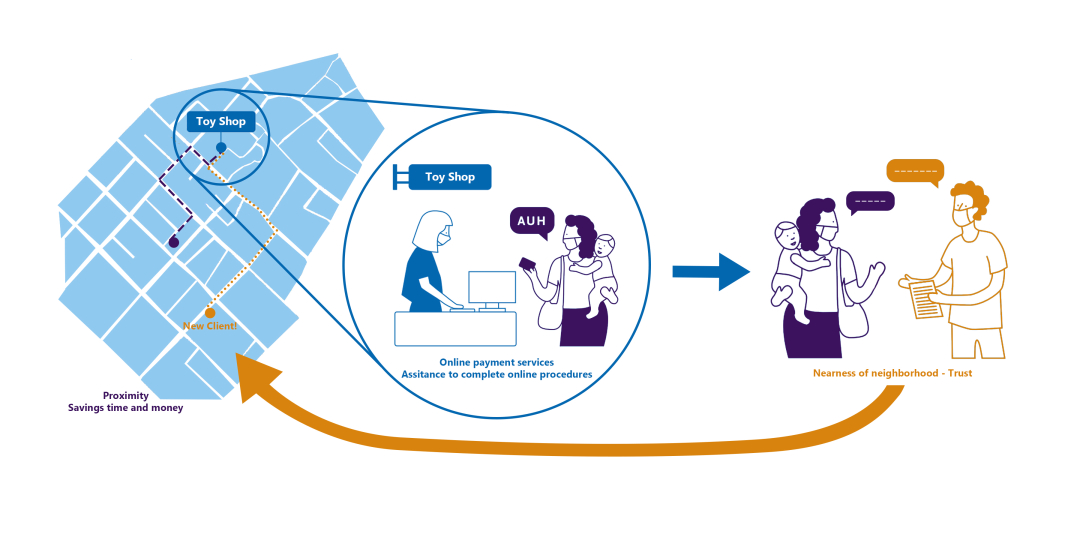During the pandemic, the imposed mobility and physical presence restrictions accelerated the need to advance in digitalization processes. In areas where there is no financial infrastructure (far from banks, ATMs, and payment centers) and the use of digital systems is scarce, some stores saw an opportunity to cover that existing need by offering services related to the use of digital platforms, mainly but not exclusively, to make online payments, as an additional offer to their core business (bookstore, pharmacy, among others). Apart from stores, this form of service may also be offered by individuals (charging by each person’s income) or in community spaces (free of charge). In all cases, the users value proximity and reliability the most. Social manager networks (also known as territorial integrators) offer support and advice to complete procedures mainly related to social programs, IDs, printing, and photocopies by using their own technological devices. These networks also played other social roles for the community. “(...) we appointed her as social manager. She is in touch with the bank staff and can help manage banking procedures. She helps to manage the Emergency Family Income (IFE, by its initials in Spanish), Cuenta DNI (free-of-charge digital wallet), CBU (bank routing number), and online procedures.” (Referent, city of Buenos Aires). From “Shared Search: CoLaborative Solutions Mapping”. Social organizations also offered digital consulting services. Neighbors explain that they resort to this service because they have difficulties in completing the procedures, either due to a lack of knowledge of the red tape, understanding the apps, having connectivity, or modern devices. To use the service, they initially seek advice on how to proceed and then return with the necessary documentation. “We are often asked to help with digital procedures. Most of them don’t have a computer, and mobile phones don’t allow them to access these procedures”. (Referent, city of Buenos Aires). From “Shared Search: CoLaborative Solutions Mapping”. This type of service appeared as a response to the lack of nearby infrastructure for the payment of utilities, with the corresponding costs, time, and needed arrangements associated with traveling to carry out these operations, a low level of literacy, confidence and/or security in the use of cell phones, and a lack of connectivity. Additionally, this intermediation not only makes payments easier, but also allows completing different procedures that are difficult to understand, complex to manage, or involve fulfilling requirements which are hard to be explained (e.g. applying for the Universal Child Allowance [AUH, by its initials in Spanish], the Workers Identification Number [CUIL, by its initials in Spanish] certificate, the Student Travel Ticket, etc.) The basis for this informal intermediation is trust, a result of the nearness of the neighborhood where it is the same people that live there who “assist” with these tasks, and, what is more, most of the new customers come due to recommendation by other neighbors. This service is so necessary for places with less infrastructure that some customers come from other neighborhoods to carry out these operations. The virtual space still appears to be a very distant and hostile environment for worse-off people and it highlights the importance of support as regards the completion of complex transactions for users. As a lesson, the design of financial tools for left-behind populations must take trust and proximity to infrastructure as an input to work. In contrast to the traditional offer, the adoption of new financial and digital services by local stores, equipped with computers and Internet access, stands out. In turn, this type of solution boosts local markets, and also decompresses and decentralizes procedures. Moreover, when geographic proximity is combined with other variables, such as peer-to-peer trust, this alternative becomes more meaningful. This solution of informal intermediation was also tested through a strategic alliance with a local municipality in the province of Entre Ríos. The “Con Vos” (With You) Network aimed to encourage the adoption of these services by stores, and at the same time, to experiment with the best tools for the success of this action. This activity managed to promote digital literacy through collaboration among people in the same neighborhood, develop local markets by improving the management capability of merchants and increasing their sales, and avoid the gathering of people in offices to take care of their health. Finally, this action has encouraged the municipality to digitalize more procedures, thus promoting open government and smart cities from citizenship to government. (For more information check this UNDP Blog).

https://www.undp.org/es/argentina/publications/busqueda-compartida-mapeo-de-soluciones-colaborativo-inclusion-financiera-y-recuperacion-economica
https://www.undp.org/es/argentina/publications/de-cerca-inclusion-financiera-y-soluciones-territoriales
 Consent to share form or official link.
Consent to share form or official link.

 8Decent work and economic growth
8Decent work and economic growth 9Industry, innovation and infrastructure
9Industry, innovation and infrastructure 10Reduced inequalities
10Reduced inequalities 17Partnerships for the goals
17Partnerships for the goals
Comments
Log in to add a comment or reply.